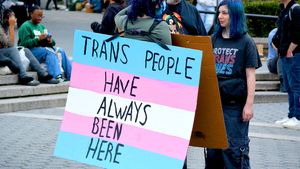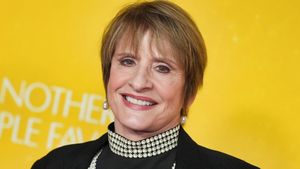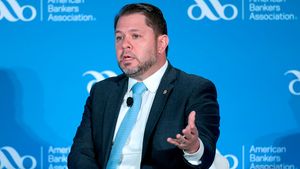Despite increased pressure from gay and lesbian advocates to “evolve” his position on marriage equality a little sooner, President Barack Obama did not delve into the issue for his Tuesday evening State of the Union address, one that focused heavily on strengthening the economy and fostering innovation in the face of a fiercely competitive global market.
The prepared remarks of Obama’s 6,757-word speech made mention of one of the seminal accomplishments during his administration thus far: legislative repeal of the 1993 “don’t ask, don’t tell,” policy, a victory he both reflected on and promised would usher in a new era of open service for gay and lesbian service members this year.
"Our troops come from every corner of this country — they are black, white, Latino, Asian and Native American. They are Christian and Hindu, Jewish, and Muslim. And, yes, we know that some of them are gay,” Obama said. “Starting this year, no American will be forbidden from serving the country they love because of who they love.” (The declaration drew divided applause: To Obama’s right, Vice President Joe Biden clapped with vigor; to his left, House Speaker John Boehner declined to follow suit.)
But marriage equality, clearly the holy grail of civil rights advancements for national LGBT groups and an issue at the heart of multiple state battles, was not mentioned. That left some advocates, though perhaps not surprised, wanting more.
“I thought it was a good speech, aspirational in many ways, as it should be, even though I thought the president missed an opportunity to build on the repeal of 'don't ask, don't tell' and lead the nation forward toward full LGBT equality,” said Richard Socarides, president of Equality Matters and a former White House adviser to President Bill Clinton.
In recent days, prominent advocates, authors, and pundits had called for not only a mention of marriage in the State of the Union address, but an endorsement of what many in the movement believe to be inevitable: a presidential seal of approval on marriage rights for gay and lesbian couples. The administration’s No. 2, Vice President Joe Biden, indicated as such in December when he said on Good Morning America that “there is an inevitability for a national consensus on gay marriage.”
more on next page...
\\\
(continued)
In a Sunday New York Times op-ed, Dan Savage, creator of the “It Gets Better” project, wrote, “The president — perhaps after introducing Daniel Hernandez Jr., the openly gay intern credited with saving [Arizona] Rep. Gabrielle Giffords’s life — should declare that the trend is clear: [T]his country increasingly believes that Mr. Hernandez and other lesbian, gay, bisexual, and transgender Americans should have all the same rights and responsibilities as other citizens.”
Kerry Eleveld, web editor of Equality Matters and former Washington correspondent for The Advocate, wrote in a Friday Washington Post op-ed that there is a “serious flaw in the president's position of viewing civil unions as a path to giving same-sex couples equal relationship recognition,” given that the federal government currently denies parity for same-sex couples, a result of the 1996 Defense of Marriage Act.
Obama’s position on gay marriage has been one of careful calculation in recent months. The president told Eleveld in a December interview that he’s “wrestling” with the issue, two months after he said to AmericaBlog Gay’s Joe Sudbay that “attitudes evolve, including mine," in respect to marriage equality.
“I have no particular insight in what this president will do other than his words that he is evolving,” said Chad Griffin, board president of the American Foundation for Equal Rights, the group behind the federal challenge to California’s Proposition 8. “Our job is to be as aggressive as we can be. And we have to work harder to move this President and this Congress toward a position for the freedom to marry, and to show all Americans the real-life consequences of inequality. And we see them every single day.”
How to further influence President Obama on the issue in the run-up to the 2012 presidential election?
"Press him at every turn," Socarides said, "and do so creatively and strategically."


























































































































